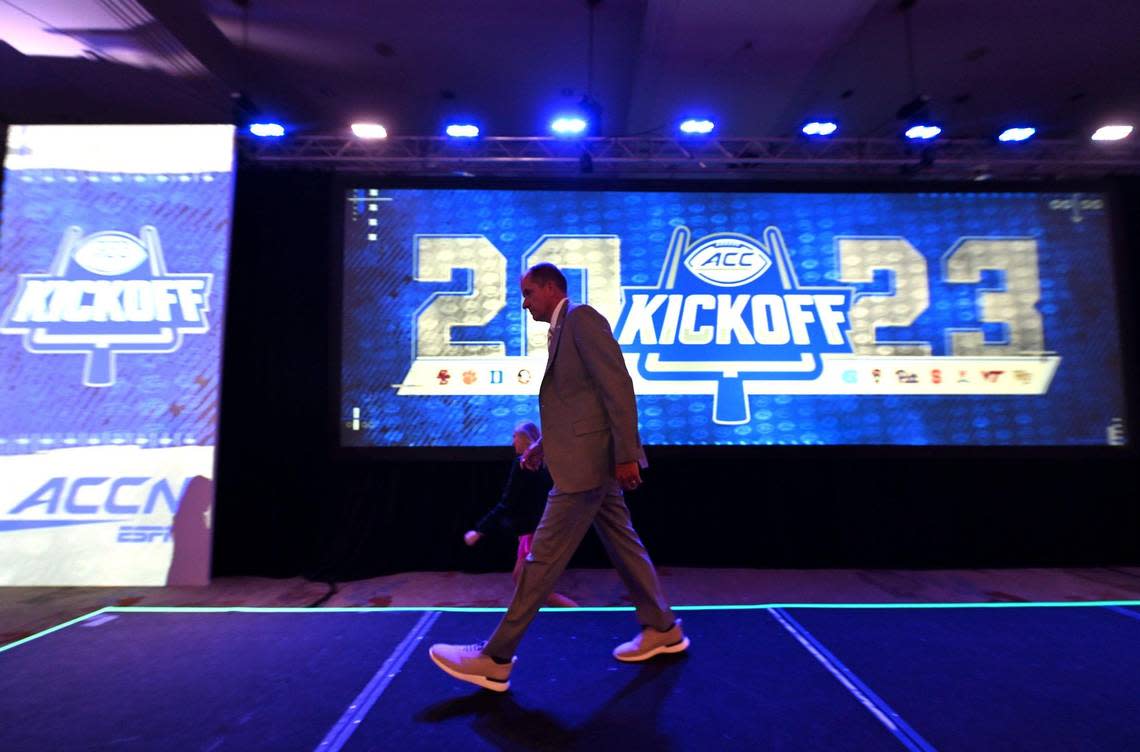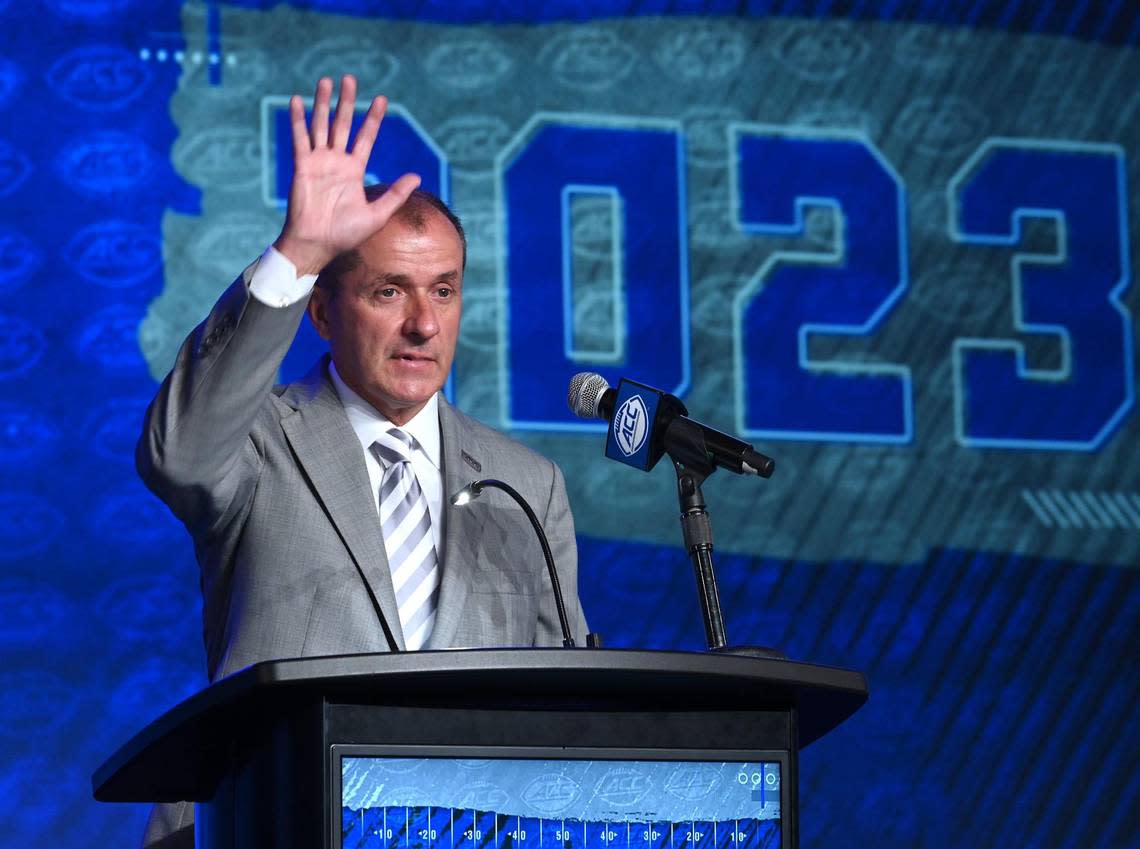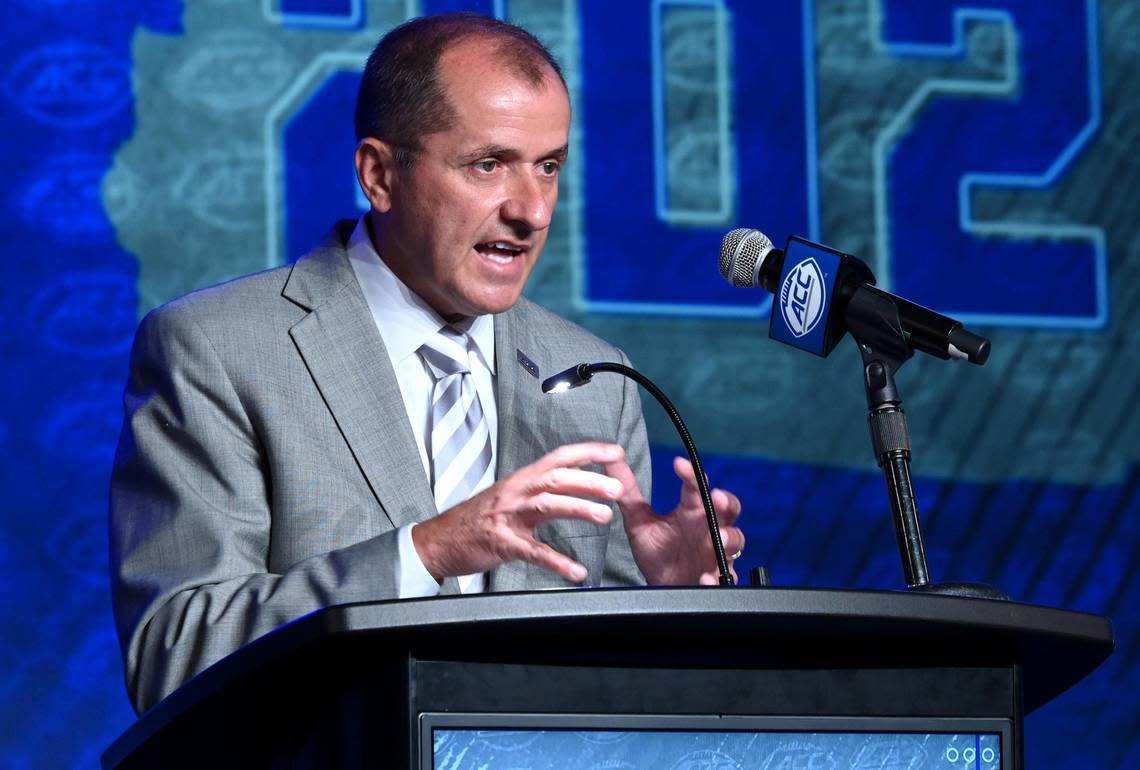In wake of Northwestern hazing scandal, ACC commissioner says he championed athletes’ safety
Though three separate lawsuits related to the Northwestern hazing and mistreatment scandal — two have been filed, one is pending — have named ACC Commissioner Jim Phillips among the defendants, the former Northwestern athletics director said Tuesday in his opening remarks at ACC Kickoff that he never condoned or tolerated such behavior.
“This is a very difficult time for the Northwestern community,” Phillips said Tuesday. “My heart goes out to any person who carries the burden of mistreatment or who has been harmed in any way. During my 30 year career in college athletics, my highest priority has always been the health and safety of all student athletes.”
Phillips is among several current and former Northwestern officials named in three lawsuits in which the victims say they were subject to hazing and mistreatment while they were athletes at Northwestern during Phillips’ tenure, from 2008-21. Two lawsuits, each lodged by former football players — identified in court documents as John Doe 2 and John Doe 3 — were filed last week in a Chicago court. A third, by a former volleyball player identified as Jane Doe 1, has been prepared by her attorneys with plans to file it this week.
Northwestern fired longtime football coach Pat Fitzgerald and baseball coach Jim Foster, who had only been at the school since last year, earlier this month. Foster’s firing came after players allege he created at toxic environment and the school conducted a human-resources investigation of his program.
The first lawsuit against Northwestern, filed last Tuesday in Chicago by a former football player identified as John Doe 1, did not name Phillips among the defendants. But complaints filed by John Doe 2 and John Doe 3 added Phillips to a list of defendants that includes current Northwestern president Michael Schill and athletics director Derrick Gragg, along with former president Morton Schapiro and the school’s Board of Trustees.
The complaints allege the school allowed them to be hazed when they were forced to participate in sexual acts and receive punishments that inflicted physical and psychological trauma.
“Jane Doe 1’s case is an example of how an enabled culture and an enabled coach had become accustomed to practices of hazing and abuse for years, if not decades,” attorney Patrick A. Salvi said in a statement on Monday. “We see in Jane Doe 1’s story how hazing and abuse causes physical and emotional harm. Her story is sadly not uncommon, and it permeates across sports, men and women, and across campuses. Here, we have a university where many brave young men and women are standing up for themselves, and we hope it’s a sign of things to come, where student athletes are not abused in the pursuit of wins for the school but treated like the human beings they are.”
Ben Crump, an attorney representing other Northwestern athletes who are suing the school, said the scandal is the “MeToo movement for college sports.”
Fitzgerald has hired former federal prosecutor Dan Webb as his lawyer. Webb said Fitzgerald did not know or participate in the alleged hazing.
“Moreover,” Webb wrote in a statement published by the Chicago Tribune, “the facts and evidence will show that coach Fitzgerald implemented and followed numerous procedures and protocols to ensure that hazing would not occur, and he repeatedly emphasized to Northwestern’s student-athletes that hazing was forbidden and, if anyone was aware — or was the victim — of hazing, that they should immediately report it so that he could stop it.”
Though he took over as Northwestern’s athletics director two years into Fitzgerald’s tenure as head coach, Phillips awarded Fitzgerald three contract extensions, including a 10-year contract signed in January 2021, shortly before Phillips left for the ACC.
At the time, Phillips lauded Fitzgerald, saying “Over the course of his tenure, Coach Fitzgerald has built a culture of unwavering belief in excellence both on and off the field, and led our Wildcats to unprecedented sustained success.”
Last Thursday, after the first of the lawsuits were filed that included him as a defendant, Phillips defended his work to protect athletes.
“Any allegation that I ever condoned or tolerated inappropriate conduct against student-athletes is absolutely false,” Phillips said in a statement last week. “I will vigorously defend myself against any suggestion to the contrary.”





